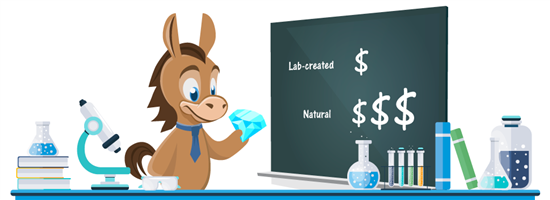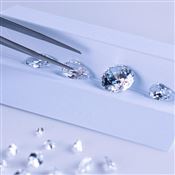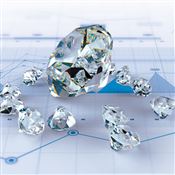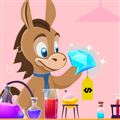Lab Diamond Prices
Lab diamonds offer natural diamond beauty at a lower price. Find out if they hold their value and how jewelers can tell if your diamond came from a lab.
 |
In the market for a diamond? You may be deciding between lab-created and natural.
Since lab-diamonds cost less, they're good for tight budgets. But should you consider their resale value too?
Before buying, find out how lab diamond prices compare to natural diamonds and if they'll be worth anything in the long run.
- Can a jeweler tell if a diamond is lab-created?
- What is the average lab diamond carat size?
- How much is a lab-created diamond?
- What is the lab diamond price per carat?
- What is the difference between lab-created and natural diamond prices?
- What are off-sized lab diamonds?
- Do lab-created diamonds hold value?
- Why are lab diamonds still expensive?
- Why are lab diamond prices falling?
- Where to purchase a lab-created diamond?
What is a Lab-created Diamond?
Lab-created diamonds are diamonds that are grown under controlled conditions in a laboratory. Also called lab-grown diamonds, they are chemically and visually identical to natural diamonds.
Earth-mined diamonds can grow hundreds of miles below the planet's surface and can take billions of years to form. Lab-growing tries to reproduce the temperature and pressure of that environment to create diamonds faster and more affordably.
Can a Jeweler Tell if a Diamond is Lab-created?
It can be difficult for even a trained jeweler to tell the difference between Earth-mined and lab diamonds. This is why vendors are required to label lab-created diamonds so that buyers know exactly what they're getting.
Vendors will label their lab diamonds with a microscopic number on the girdle (the narrowest part of the diamond at its edge). The inscription is invisible to the naked eye and allows jewelers to be certain that they have received a lab-created diamond.
What is the Average Lab Diamond Carat Size?
Similar to a natural diamond, the average lab diamond engagement ring is around 1 carat.
However, for the cost of a 1-carat lab diamond, you can expect better size, color, and clarity than if you spent the same amount of money on a natural diamond.
For example, if you have a $1,000 budget, you will be able to purchase a better quality 1-carat lab diamond than an equally sized natural diamond.
Lab diamonds allow you to extend your budget and get the stone of your dreams without breaking the bank. Find out how much a lab diamond will set you back below.
How Much is a Lab-created Diamond?
A lab-grown diamond is considerably lower in price than a natural diamond of equivalent quality. Several years ago, lab diamonds were about 20% less than a similar natural stone.
Recently, prices have come down even more. In some instances, you can now find lab diamonds selling for 40% to 75% less than natural diamonds.
Lab-created diamonds, like Earth-mined diamonds, are priced based on the 4 Cs. The cut, clarity, color, and carat weight are graded just like natural diamonds. Each factor influences the final sale price:
Carat
Carat measures the diamond's weight. The higher the carat, the more expensive the stone will be. There's also additional cost for whole carat weights, like 1.0, 1.5, and 2.0 carats, because of high demand.
Cut
Cut is the most important factor that impacts a diamond's sparkle. Excellent/Ideal cut diamonds are the most sparkly and beautiful, so they command the highest prices.
Color
Diamond color is graded on a scale from D (colorless) to Z (light yellow/brown). Colorless diamonds are the most expensive since they're super rare. But the difference in color isn't huge, so we recommend choosing H color for the best value.
Clarity
Inclusions (blemishes) affect diamond clarity, which can range from I (included) to FL (flawless). The more flawless the diamond, the pricier it will be. VS2 diamonds are the sweet spot since they're eye-clean but more affordable.
Shape
A round diamond is the priciest since it's the most expensive to cut. You can save if you choose a fancy-shaped diamond, especially emerald and cushion cuts. They're the cheapest diamond shapes because they don't waste as much rough diamond.
What is the Lab Diamond Price Per Carat?
A lab diamond of medium quality may only be $1,000 for a 1-carat stone. In contrast, a natural diamond of average quality can be $2,000-$10,000 (or much more) for a 1 carat stone.
Here's a comparison of natural vs. lab diamond prices* in different carat weights. We use real examples from James Allen since they offer competitive pricing:
| Natural Diamond | Lab Diamond | |
|---|---|---|
| 0.70 carat | $2,130 | $700 |
| 1 carat | $5,970 | $1,890 |
| 1.5 carats | $16,250 | $2,390 |
| 2 carats | $27,940 | $3,820 |
| 3 carats | $40,620 | $8,120 |
*Prices are current and diamonds are in-stock as of September 27, 2022. As a benchmark, all diamonds are round, H color, and VS2. These are the specs that will give you the best value.
The biggest factor dictating the price of 1-carat stones is the quality of the cutting, or faceting. This refers to the tiny flat surfaces on the diamond that allow the light to reflect. Better cutting leads to a more brilliant stone, and may even be able to disguise minor internal imperfections.
Here's a table of lab vs natural diamond prices in different cut grades. Note that most retailers don't sell diamonds lower than Good cut.
| Cut Grade | Natural Diamond | Lab Diamond |
|---|---|---|
| Good | $11,148 | $1,122 |
| Very Good | $11,684 | $1,130 |
| Excellent/Ideal | $12,249 | $1,821 |
*Prices are current and diamonds are in-stock as of September 27, 2022. As a benchmark, all diamonds are round, H color, and VVS2.
The price of lab diamonds is also partially determined by the seller. As with all gems, there is a retail markup to pay for employees and storefronts so that the seller can make a profit. For the most part, smaller stores have higher prices compared to large retailers.
What is the Difference Between Lab-created and Natural Diamond Prices?
While the market has been changing over the last several years, the trend in lab diamond prices is going down compared to mined diamond prices. You can expect to pay between 50% to 80% of the price of a natural diamond, depending on the size and quality of the stone.
One of the most attractive qualities of lab diamonds is that they are considerably more affordable than their natural counterparts.
This means that you can get a larger or better-quality lab diamond for the same price as a smaller or less clean Earth-mined diamond. However, keep in mind that lab diamonds don't hold the same resale value as a natural diamond (more on this later).
What are Off-sized Lab Diamonds?
Many diamonds that are sold are half a carat, 1 carat, 1.5 carats, 2 carats, etc. These "round numbers" are considered to be the most popular and desirable sizes.
However, many diamonds don't fit into these exact weight categories. For example, a diamond may be 1.35 carats, or 0.89 carats. These in-between carat weights are called "off-sized."
Off-sized stones can be a real bargain, especially in shapes other than rounds. There is a significant price difference between a 1-carat diamond and one that weighs 0.97 carats. If you're willing to purchase a stone that's a tiny bit smaller, you can potentially save a good deal of money.
Let's compare the price and dimensions of an off-sized vs. "round number" carat diamond:
| Price | Dimensions | |
|---|---|---|
| 0.98 carat | $5,340 | 6.39x6.43x3.94 |
| 1.0 carat | $5,970 | 6.3x6.35x4.02 |
*Prices are current and diamonds are in-stock as of September 27, 2022. As a benchmark, all diamonds are round, H color, and VS2. These are the specs that will give you the best value.
Usually, the difference between a 1-carat diamond and a slightly smaller off-sized stone is not even visible to the naked eye. But the difference in price isn't small.
Do Lab-created Diamonds Hold Value?
The value of lab diamonds has been a topic of debate in recent years. Diamonds are traded as commodities, and their value fluctuates based on current market trends.
This means that the diamond you bought for $1,000 may go up and down in value significantly. (This is one of the main reasons why you should have your engagement ring appraised every few years.)
If you're hoping to resell your lab diamond in the future, there are a few things to keep in mind about how its value may change.
The Resale Market for Lab Diamonds
In general, only very large or very rare, fancy colored diamonds retain most of their value.
On average, you will likely only get 20% to 60% of the original purchase price if you resell your mined diamond.
The resale value of lab diamonds will be lower than natural diamonds because the market is much more limited. Most jewelry stores do not purchase pre-owned lab diamonds from customers. There are simply fewer buyers that want them at this time.
Trends in the Lab Diamond Industry
As consumer recognition of lab diamonds grows, there might be an increase in the resale potential of these stones. If more people want them, the secondary market value could go up.
It's interesting to note that DeBeers, the world's largest diamond mining company, has recently started creating and selling its own lab-grown diamonds. In the eyes of some industry professionals, this lends legitimacy to lab diamonds.
Getting Your Lab Diamond Certified
Another factor adding to the value of lab diamonds is the potential for GIA certification.
In 2007, the Gemological Institute of America recognized that lab-created diamonds are, in fact, diamonds. They began grading them using the same standards used for mined diamonds.[1]
The GIA does not assign dollar values to the stones they grade, and the certificate doesn't affect the inherent value of the stone.
However, diamonds with a GIA certificate have a higher sale and resale value than the same stone without certification. This is because the GIA is known for its high standards in grading, and you can be assured of the accuracy of their results.
Why are Lab-created Diamonds Still Expensive?
You may be able to find very large, clean lab-created rubies and sapphires for well under $100. But lab diamonds can still cost thousands. Why is there such a big difference?
- The technology is newer.
The technology to produce other lab gems, like lab sapphires and rubies, has been established for decades. This means that production costs for those stones have come down significantly.On the other hand, research is still being done on the best ways to grow lab diamonds. The technology to grow clean stones half a carat or larger has only been around for about a decade.
The development of new equipment is costly and the process of experimentation can be time-consuming. Plus, the electricity required for lab diamond production leads to a higher cost per carat than other synthetic gems.
- Diamonds are still in high demand.
Another reason lab diamonds are more expensive than other lab gems is that diamonds are so desirable. There is an element of supply and demand that dictates the market prices.Diamonds are especially prized for their "fire" and brilliance. If you've ever admired the sparkling rainbows of a diamond in sunlight, that is the fire. Few gems have that kind of brilliance, which is one of the factors in making them so beloved for hundreds of years.
- Diamonds are prized for their durability.
Diamonds are still one of the hardest substances on the planet. Since lab diamonds are chemically identical to Earth-mined diamonds, they share their incredible strength and wearability.
Growing diamonds in a lab is no guarantee of their quality. Some of the rough gems might have visible inclusions, or the body color might have an undesirable tint. Since most buyers want near-colorless, eye-clean stones, there is a degree of uncertainty involved in the growing process.
Why are Lab-created Diamond Prices Falling?
When lab-grown diamonds were first commercially created in the 1950s, the technology was new and the equipment was very expensive. These first synthetic diamonds were developed for industrial use. They were small and dark brown, not jewelry-grade material.
Over the years, techniques for growing diamonds have improved so much that the equipment and manufacturing costs have come down significantly.
The improved techniques also mean that there are more lab diamonds available on the market.
While they used to be scarce, lab-created diamonds are now available at many retailers. Plus, more non-jewelry industries began using diamonds for drilling, polishing, and cutting, which also drove down prices. The increasing availability and competition among sellers contribute to the trend in lower prices.
Since the cost of growing diamonds is decreasing, companies are able to sell lab diamonds at lower prices. Not long ago, a lab diamond used to cost only about 20% less than a natural diamond of equal quality. Now, lab diamonds are available from reputable sellers for 40% to 75% less than Earth-mined diamonds.
Where to Purchase a Lab-created Diamond?
As with any diamond purchase, it's important to be sure the seller is reputable. They should always be upfront about the diamond's lab origins.
Brick-and-mortar jewelry stores
If you want to see your diamond in person before buying it, some national retail chains are now offering lab diamonds. You can see lab diamonds next to natural diamonds and see for yourself that you can't distinguish between the two types of stones.
Your local hometown jeweler might also carry lab diamonds, but if they're a smaller independent store, they may only have a few stones to choose from. Generally, a small store will have higher prices compared to a larger online retailer.
Online diamond retailers
Several online stores offer magnified photos and 360-degree virtual tours of their entire inventory. This allows you to look into the heart of the stone without seeing it in person. These sellers often have much more variety in shapes and sizes of stones than smaller stores.
If you're looking for a large selection of sizes and shapes, Blue Nile and James Allen are both very well-regarded. Both of these stores are known for their vast inventories of both natural and lab-grown diamonds. You can easily compare lab and natural diamonds of equal quality and size to see the differences in pricing.
If you're ecologically conscious, Brilliant Earth offers recycled metals and a "Beyond Conflict-Free" promise. If you know for certain that you want a lab diamond, Clean Origin specializes in selling only lab diamonds.
What the Experts Say
Why is there such a difference in pricing between lab and naturally created diamonds? CreditDonkey asked a panel of industry experts to answer readers' most pressing questions. Here's what they said:
Bottom Line
If you're looking to buy an engagement ring at a more affordable price, a certified lab diamond from a reputable seller is a good option.
However, don't count on lab diamonds as a good investment. As production technology continues to advance and supply goes up, the resale market for lab diamonds will continue to fall.
References
- ^ GIA. Does GIA grade laboratory-grown diamonds?, Retrieved 1/6/2023
Write to Margarette M at feedback@creditdonkey.com. Follow us on Twitter and Facebook for our latest posts.
Note: This website is made possible through financial relationships with some of the products and services mentioned on this site. We may receive compensation if you shop through links in our content. You do not have to use our links, but you help support CreditDonkey if you do.
|
|
|





